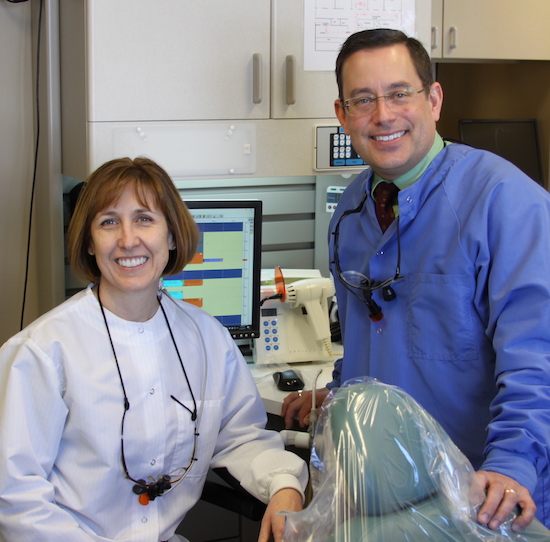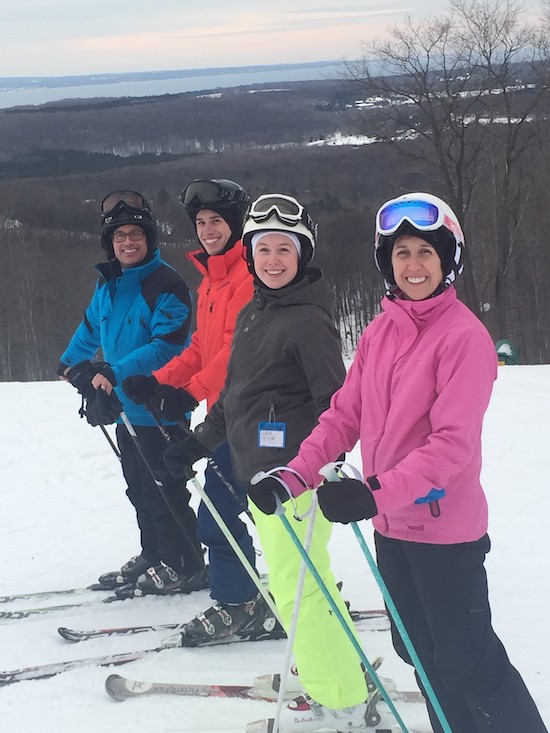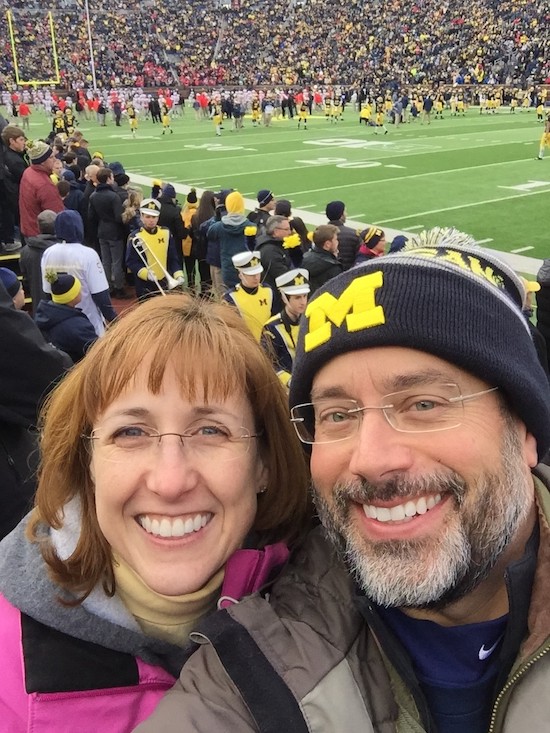Donor Profile: Drs. Eric and Beth Knudsen love dentistry — and life — in Michigan’s U.P.12 min read
This profile, posted Feb. 26, 2019, is one in a series highlighting School of Dentistry alumni, donors, faculty and students.
The lure of Escanaba in the moonlight is not fiction for Eric and Beth Knudsen.
With no apologies to actor and playwright Jeff Daniels, the Knudsens love the Upper Peninsula town all day long, not just after dark when the moon is shimmering on Little Bay de Noc. And their passion for the place extends year-round, not just during the fall deer camp season made famously funny in Daniels’ play and movie, “Escanaba in da Moonlight.”

The Knudsens are a husband-and-wife dentist team who are part of the fabric of the town of about 13,000 people on Lake Michigan’s northern shoreline. Eric grew up there, watching his father, Bill, a dentist, provide health care for hundreds of local residents over the years. There was never much doubt about what Eric would choose as a career: He followed his father to the University of Michigan School of Dentistry and returned to join the practice. The unexpected – and providential – development was that Eric and Beth met as undergrads at U-M and she also chose dentistry as a career, navigating dental school a year behind Eric.
Over the last 22 years of practicing together and raising their family, Eric (DDS 1995) and Beth (DDS 1996) have become actively involved in what Eric calls the “tight-knit community” of Escanaba. That starts with the Knudsen family. Bill (DDS 1968) is now retired after 38 years of practice, but he didn’t go far. He and Eric’s mother, Sandy, a retired kindergarten teacher, live just down the street from Eric and Beth. Eric’s sister, Krista, is a former teacher and now principal at a kindergarten school in town. Many of the patients at Knudsen Dentistry are people Eric has known his entire life. During high school, he worked at a local food market, bagging groceries for townspeople who are now his patients. “A lot of our patients started with Eric’s dad and they saw Eric grow up,” Beth said. “They’ll say, ‘I remember when you got your first bike’ or other things. It has a family feel about it.”

Choosing to live in a small town, particularly when it’s your hometown, comes with certain responsibilities for civic engagement, Eric says. His family’s interest in education, along with having two children who were headed for the public schools, prompted Eric to run for election to the Escanaba School Board, which he served for two terms, including a rotation as board president. “Those eight years on the school board were tough,” he said, noting that educating a community’s children involves difficult decisions about finance and other issues. “There were more sleepless nights because of the school board than there ever have been for dentistry. But I’m really glad I did it. I think it’s just an obligation a person has in their community.”
On a recent February morning, Beth spent part of her day off at a local elementary school where five classes of children were merged for a presentation on good oral health care, timed to Dental Health Month. She’s done this for several years. “It is important to do the community presentations – it’s my way of getting out into the community,” she said. “I really enjoy the children. Obviously, we love to see that they have been to the dentist, but there are kids who have not been. So I will always bring in all my gear and all my dental office clothes. I talk about what they are going to see at the dentist office and why it is not scary. We talk about brushing and flossing, and about good and bad eating. Just things that they should know at this age. The kids had some good questions. One told me that he was going to check his snack drawer when he went home to make sure he didn’t have bad snacks in there.”

The Knudsens’ community involvement has often been tied to their children’s school and extracurricular activities. Daughter Abby is a high school senior whose swim team participation has kept her parents on the road to meets around the U.P. This fall she heads to U-M to study chemical engineering and join her brother, Matt, a junior on track to follow his parents’ path to dental school. He’s prepared by participating in the Undergraduate Research Opportunity Program and working in the dental school pathology lab. Like most residents of the Upper Peninsula, the family spends a lot of time outdoors – at their cottage on a lake near Munising or traveling around the Great Lakes, boating, fishing, hunting and skiing in the winter. Eric is a member of the local Elks Club and has been on the board of the Escanaba Country Club. Beth has held various leadership positions with P.E.O., an international organization focused on educational opportunities for women.
Despite their many personal connections and activities in the community, the Knudsens’ lives are still centered around their dental practice. They are general practice dentists who do many types of procedures, from restorative and prosthodontic to pediatric and orthodontic. That’s partly by choice, because versatility is a good business model and because they enjoy the variety. But it’s also a necessity in the mostly rural U.P. where there aren’t as many specialty dentists for referrals. If they discover someone who needs a challenging extraction, perhaps the removal of an impacted wisdom tooth, the nearest oral surgeon is an hour away, either north to Marquette or south to Marinette, Wisc. And that drive might be in addition to the hour the patient may have driven to get to the Knudsens’ practice.

Beth learned the advantage of a wide skill set when she and Eric first moved to Escanaba. For the first couple of years, she worked two days a week in a rural clinic for underserved patients. She encountered all manner of dental problems and, unlike working in a metro area like Ann Arbor or Detroit, she often had to solve the problem herself because a specialist was too far away. “It got me really comfortable doing extractions and other procedures that you may not necessarily do if you had a specialist you could hand it off to,” she said. Eric says that problem still applies today across the U.P. for most of the specialties. The 15 or so general practice dentists in Escanaba are supported by an orthodontist, an endodontist and a part-time periodontist, but other specialists are mostly an hour away or more. “That’s part of being in a more rural area,” he said. “You have to be comfortable doing more things.”
If the population and geography demographics sometimes create challenges for dentists and their patients, it has also worked over the decades to create a strong sense of camaraderie in the U.P. dental community, the Knudsens say. Dentists are committed to working together to provide excellent dental care for residents of a region where the per-capita income of the counties is often low compared to the rest of the state. “I think it’s the U.P. frame of mind,” Eric said. “With our patients, if someone is having a dental problem, if Beth and I can’t answer it between the two of us, I feel very comfortable calling up another dentist because we all know each other.”
Those connections are built through local district dental societies, participation in a joint U.P. dental society and involvement with the Michigan Dental Association (MDA). Eric has been president of the Cloverland District Dental Society for the last 16 years, taking over for his father who previously led it. Eric is also a member of the MDA Board of Trustees, where he just finished advocating for a new online dentist-mentoring program that the MDA is kicking off this year. Mentoring, networking and recruiting new dentists are of profession-wide importance, but those tasks are especially important in the U.P., something that members of the Upper Peninsula Dental Society have understood for many years.
In the mid-1990s, Dr. Nelson Smith of Escanaba advocated for the organization to create a scholarship for students who live in the U.P. and are interested in becoming dentists. The idea was to promote dentistry to promising students, then help fund their education as incentive for them to return to the U.P. to practice. The society worked with the U-M School of Dentistry to create the Upper Peninsula Dental Society Scholarship Fund. In the early years, as the fund grew in value, it was able to generate only enough interest for small scholarships that might pay for a student’s books, for example. Dr. Peter Kelly of Marquette also was an early proponent of the scholarship and became a leading donor to it. Dentists from across the U.P. helped build the fund enough over the years that more significant scholarship amounts could be awarded to one or sometimes several U-M dental students each year.
Jeff Freshcorn, director of development in the school’s Office of Alumni Relations and Development, said the fund contains about $125,000 and the goal is to reach $200,000 so that the principal will generate enough interest annually to allow for larger scholarships. About 60 scholarships have been awarded since the fund’s inception. Recipients are not bound to practice in the U.P., but most have, Freshcorn said. “In general, the fund really has effectively done what they wanted it to,” he said. “We have certainly seen, since the scholarship’s inception, lots of our graduates return to the U.P. to practice.” The first recipient, Dr. Steve Ouwinga (DDS 1998), is an orthodontist in Escanaba.
Eric Knudsen was just starting his dentistry practice when those early U.P. scholarship discussions were taking place. As he and Beth settled into their Escanaba practice over the years and became active in the regional, state and national dentistry organizations, they realized that the scholarship was a cause that they wanted to support significantly. They have committed $10,000 to the fund, above and beyond the annual fund donations they also make to the dental school.
“A lot of dentists in our area, when they retire, they just can’t get anybody interested to come north of the bridge and take over their practice,” he said, referring to the Mackinac Bridge that links lower Michigan with the U.P. “We need to provide dental care for the residents up here and so we need to get our U.P. dental graduates back up here to practice. It’s a great place to live, you can make a great living and be part of a real close-knit community. We want the scholarship to provide an incentive.” The scholarship is a way to connect the dental students with their U.P. roots, Beth said. “I think the message is, ‘The people back home are supporting me with what they can and they’re rooting for me and they want me to come back and join them.’ It’s something that we want to encourage: Come back home, come back to the U.P.”
Ultimately, though, the profession of dentistry is rewarding no matter where it is practiced, the Knudsens say. Their sales pitch for dentistry goes even deeper than their sales pitch for Escanaba and the U.P. For Beth, it’s about helping people with their very personal need of good oral health care, whether through education or by fixing a problem in the dental chair. Eric says he considers it a “luxury to be in a position where not many people can do what we can do to help a person.”
“It’s very rewarding to take a person out of pain, to make them more happy with their smile,” Eric said. “You have to recognize the little things that you do, the little joys that you get out of it. It can be a simple thing, like fixing a chipped front tooth for a woman who was so self-conscious that she came in with her hand over her mouth and wouldn’t even let the front desk see her chipped tooth. It’s little things like that. Helping a kid with their first cavity and first filling, making it a positive experience. That’s what I enjoy.”
###
The University of Michigan School of Dentistry is one of the nation’s leading dental schools engaged in oral health care education, research, patient care and community service. General dental care clinics and specialty clinics providing advanced treatment enable the school to offer dental services and programs to patients throughout Michigan. Classroom and clinic instruction prepare future dentists, dental specialists and dental hygienists for practice in private offices, hospitals, academia and public agencies. Research seeks to discover and apply new knowledge that can help patients worldwide. For more information about the School of Dentistry, visit us on the Web at: www.dent.umich.edu. Contact: Lynn Monson, associate director of communications, at [email protected], or (734) 615-1971.
